Unit 11 第3课时(Section A Grammar Focus-3b) (同步课件)-七年级英语下册同步精品课堂(人教版)
文档属性
| 名称 | Unit 11 第3课时(Section A Grammar Focus-3b) (同步课件)-七年级英语下册同步精品课堂(人教版) | 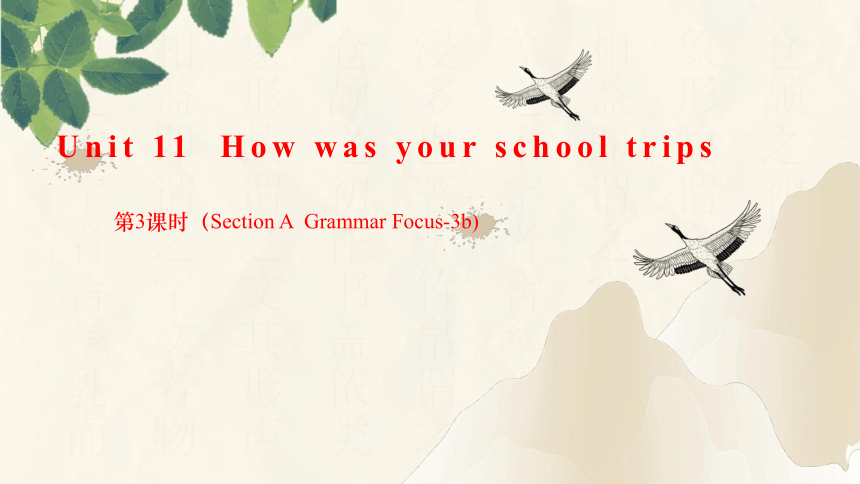 | |
| 格式 | pptx | ||
| 文件大小 | 5.9MB | ||
| 资源类型 | 试卷 | ||
| 版本资源 | 人教新目标(Go for it)版 | ||
| 科目 | 英语 | ||
| 更新时间 | 2024-04-14 11:35:24 | ||
图片预览

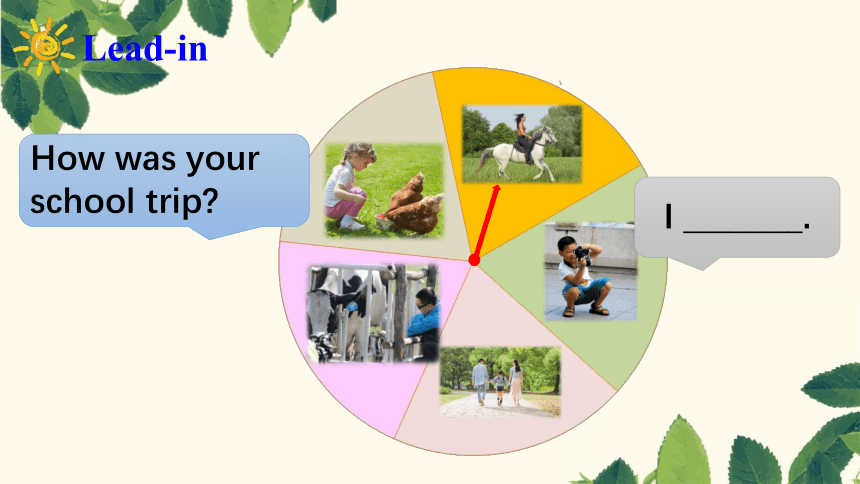
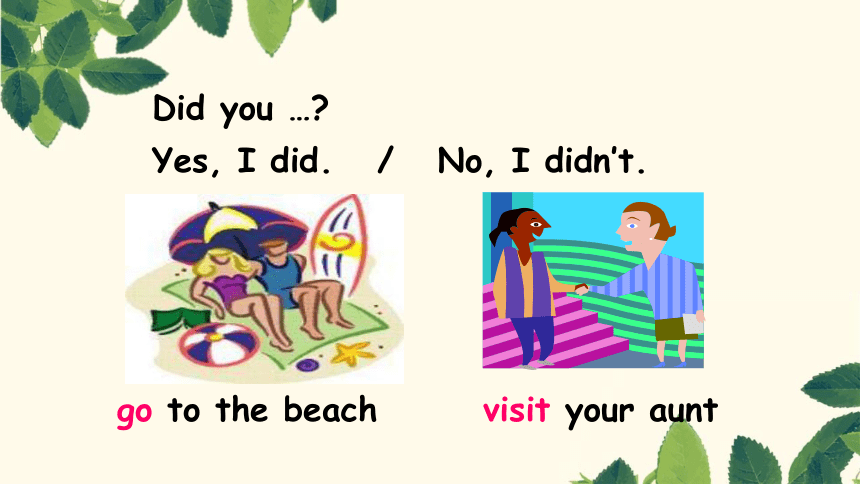
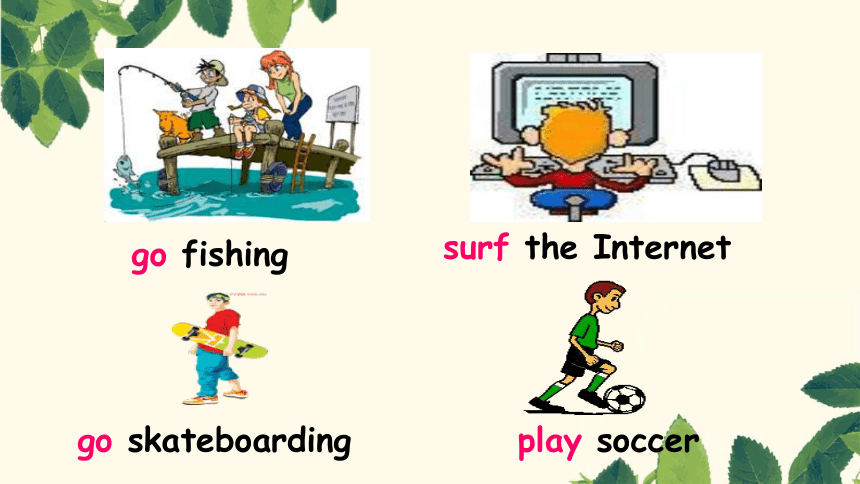
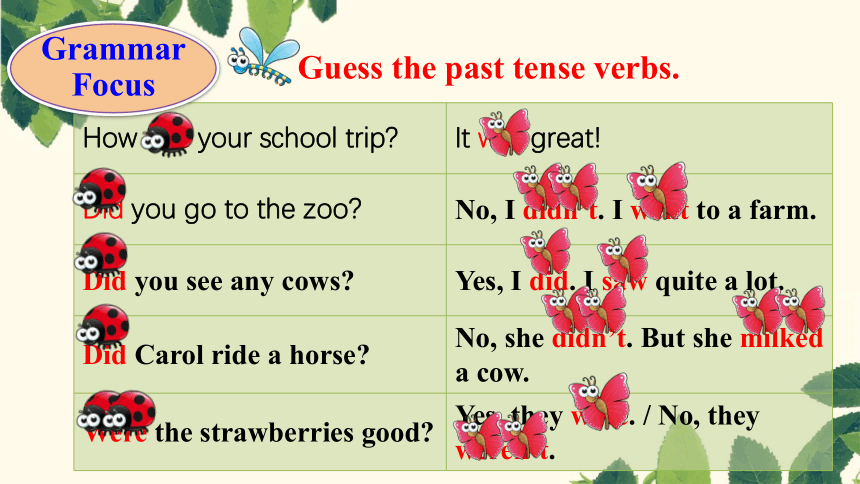
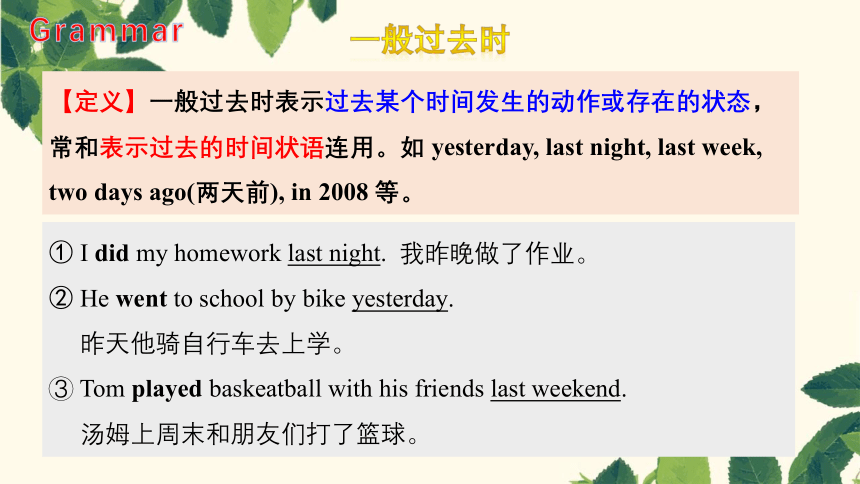
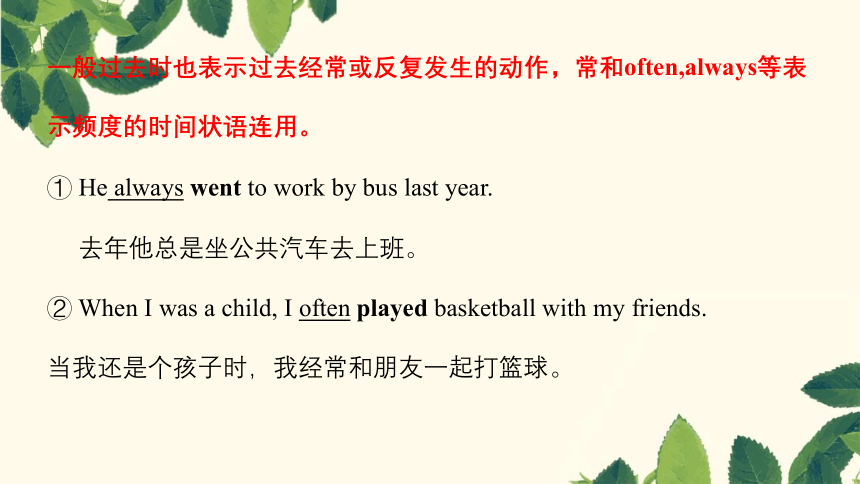
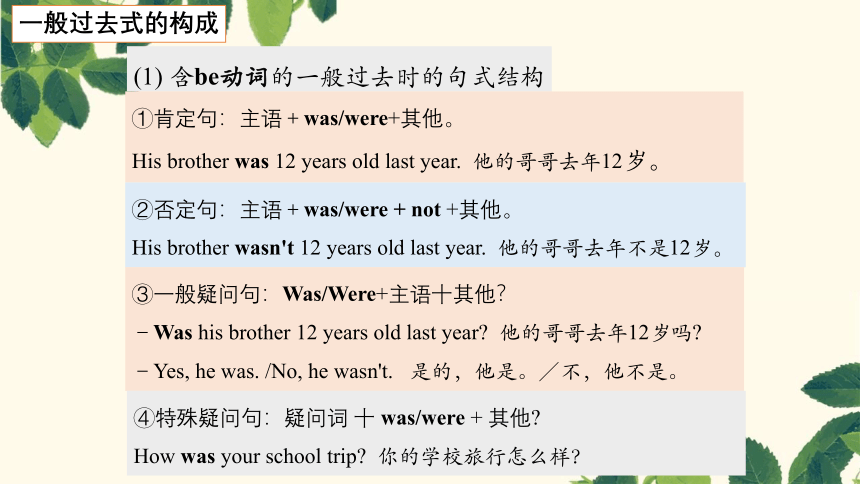

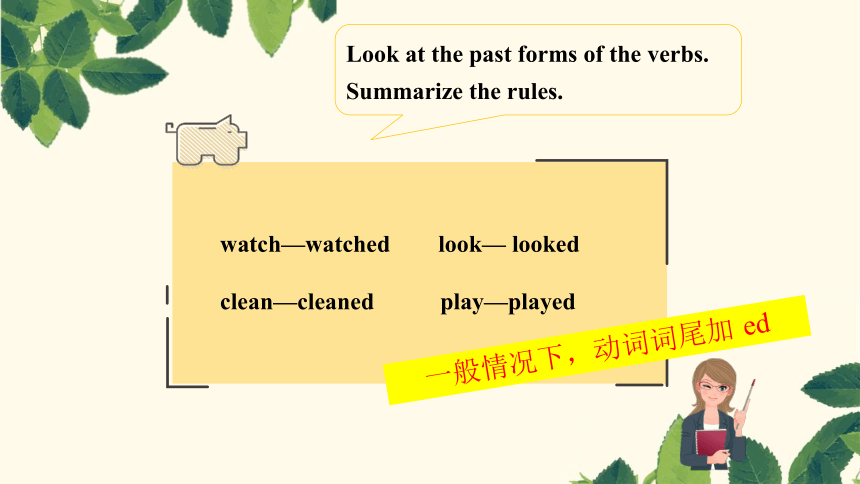
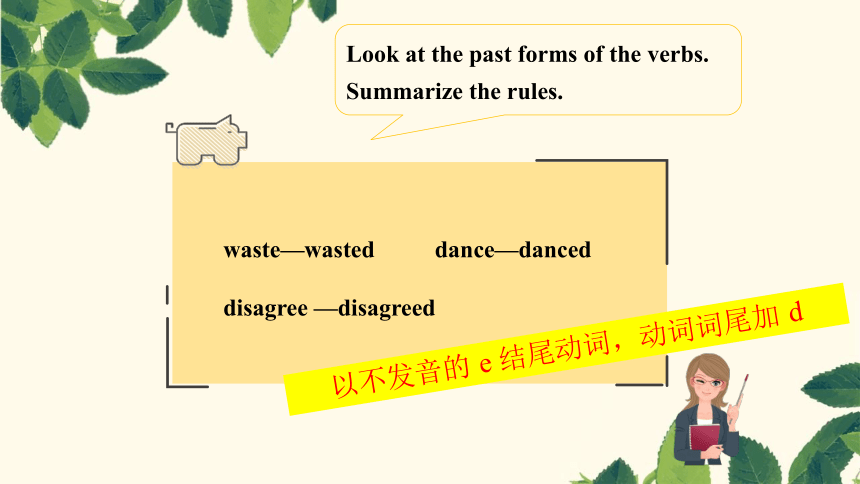
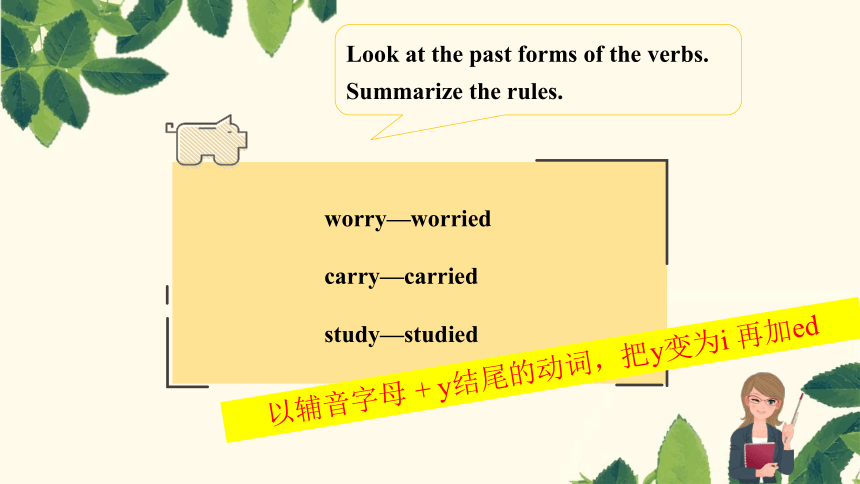
文档简介
(共31张PPT)
仓颉之初作书盖依类象形故谓之文其形声相益即谓之字文者物象之本字者言孳乳而浸多也著于竹帛谓之仓颉之初作书盖依类象形故谓之文其形声相益即谓之字文者物象之本字者言孳乳而
Unit 11 How was your school trips
第3课时(Section A Grammar Focus-3b)
Lead-in
How was your school trip
I ________.
Did you …
Yes, I did. / No, I didn’t.
go to the beach
visit your aunt
go fishing
go skateboarding
surf the Internet
play soccer
How was your school trip It was great!
Did you go to the zoo No, I didn’t. I went to a farm.
Did you see any cows Yes, I did. I saw quite a lot.
Did Carol ride a horse No, she didn’t. But she milked a cow.
Were the strawberries good Yes, they were. / No, they weren’t.
Grammar
Focus
Guess the past tense verbs.
Grammar
【定义】一般过去时表示过去某个时间发生的动作或存在的状态,常和表示过去的时间状语连用。如 yesterday, last night, last week, two days ago(两天前), in 2008 等。
一般过去时
① I did my homework last night. 我昨晚做了作业。
② He went to school by bike yesterday.
昨天他骑自行车去上学。
③ Tom played baskeatball with his friends last weekend.
汤姆上周末和朋友们打了篮球。
一般过去时也表示过去经常或反复发生的动作,常和often,always等表示频度的时间状语连用。
① He always went to work by bus last year.
去年他总是坐公共汽车去上班。
② When I was a child, I often played basketball with my friends.
当我还是个孩子时,我经常和朋友一起打篮球。
一般过去式的构成
(1) 含be动词的一般过去时的句式结构
①肯定句:主语+was/were+其他。
His brother was 12 years old last year. 他的哥哥去年12岁。
②否定句:主语+was/were + not +其他。
His brother wasn't 12 years old last year. 他的哥哥去年不是12岁。
③一般疑问句:Was/Were+主语十其他?
-Was his brother 12 years old last year 他的哥哥去年12岁吗
-Yes, he was. /No, he wasn't. 是的,他是。/不,他不是。
④特殊疑问句:疑问词 十 was/were + 其他
How was your school trip 你的学校旅行怎么样?
③一般疑问句:Did + 主语 + 动词原形 + 其他?
-Did Tom go to the park yesterday 汤姆昨天去公园了吗?
-Yes, he did. /No,he didn't. 是的,他去了。/不,他没去。
一般过去式的构成
(2)含实义动词的一般过去时的句式结构
①肯定句:主语 + 动词的过去式 + 其他。
Tom went to the park yesterday. 汤姆昨天去了公园。
②否定句:主语+didn't + 动词原形 + 其他。
Tom didn't go to the park yesterday. 汤姆昨天没有去公园。
④特殊疑问句:疑问词+did + 主语 + 动词原形 + 其他?
-Where did Tom go yesterday 汤姆昨天去了哪里?
-He went to the park. 他去了公园。
watch—watched look— looked clean—cleaned play—played
Look at the past forms of the verbs. Summarize the rules.
一般情况下,动词词尾加 ed
waste—wasted dance—danced
disagree —disagreed
Look at the past forms of the verbs. Summarize the rules.
以不发音的 e 结尾动词,动词词尾加 d
worry—worried
carry—carried
study—studied
Look at the past forms of the verbs. Summarize the rules.
以辅音字母 + y结尾的动词,把y变为i 再加ed
stop—stopped
drop—dropped
Look at the past forms of the verbs. Summarize the rules.
以一个辅音字母结尾的重读闭音节动词,双写词尾辅音字母,再加 ed
动词的过去式是在动词原形的基础上变化的。动词的过去式可分为规则动词和不规则动词。
规则动词的过去式变化如下:
(1)一般情况下,动词词尾加 ed ,如:
worked played wanted acted
(2)以不发音的 e 结尾动词,动词词尾加 d,如:
lived moved decided declined hoped
judged raised wiped
我的发现
(3)以辅音字母 + y结尾的动词,把y变为i 再加ed,如:
studied tried copied cried carried emptied
(4)以一个辅音字母结尾的重读闭音节动词,双写词尾辅音字
母,再加 ed,如:
stopped begged fretted dragged dropped
planned dotted
我的发现
do— did take— took
see— saw go—went
have—had
Look at the past forms of the verbs. Summarize the rules.
不规则动词的过去式变化规律性不强,须多加记忆
不规则动词的过去式变化规律性不强,须多加记忆:
go - went,make - made,get - got ,buy - bought ,come - came ,
fly-flew ,is/am-was,are-were ,see-saw ,bring-brought,
do-did,teach-taught, think-thought, say-said,sit-sat,put-put,
grow-grew,take-took,catch-caught,become-became,
swim-swam,sweep—swept,sing—sang,draw—drew
我的发现
Complete Jim’s letter on the left and Bill’s reply on the right.
Dear Bill,
How ____ (is) your school trip yesterday ____ (Do) you ___ (go) to the zoo _____ (do) you take any photos ____ (Do) you ____ (see) any interesting animals I _____ (go) to the zoo last year and it ____ (is) a lot of fun.
Jim
was
Did
go
Did
Did
see
went
was
3a
Letter 1
Dear Jim,
My school trip _____ (is) great! We _____ (have) so much fun! We ____ (go) to Green Park. We ________ (climb) the mountains there and _____ (see) a lot of flowers. We _____ (eat) our lunch under some trees and ______ (play) some games after that. But at about two o’clock, it ____(get) very cloudy and we ________ (worry) it would rain.
Luckily, it _______(do not), and the sun _____ (come) out again!
Bill
was
had
went
climbed
saw
ate
played
got
worried
didn’t
came
Make up a story. Each student
adds a sentence.
3b
3b
Make up a story. Each student adds a sentence.
Last week I visited my aunt’s house.
_______________________________
_______________________________
_______________________________
_______________________________
_______________________________
________________________________________________________
________________________________________________________
The weather was beautiful.
We went fishing.
We climbed the mountains.
We sat under a big tree.
We got very tired.
The scenery is beautiful on the top of the mountain.
We arrived at the river.
Language points
1.Luckily, it didn’t, and the sun came out again.幸运地,没有下雨,太阳又出来了。
1)luckily副词,意为“幸运地;好运地”。通常放在句首,用来修饰整个句子。
Luckily, we got there on time.
幸运地,我们准时到达了那里。
【拓展】
①luck名词,意为“运气”。
What good luck !
多么幸运啊!
②lucky形容词,意为“幸运的”。
You are a lucky dog.
你真是一个幸运儿。
2)sun名词,意为“太阳”,为世界上独一无二的事物,其前通常要加定冠词the,类似的名词还有moon“月亮”,earth“地球”等。
The sun rises in the east and sets in the west.
太阳从东方升起,在西方落下。
【拓展】
sunny形容词,意为“晴朗的”。
It's sunny today.
今天天气晴朗。
It was a sunny day yesterday.
昨天是一个晴天。
3)come out意为“出来”,其中out为副词。
The sun is coming out.太阳就要出来了。
【拓展】come out的其他含义:
①(花)开放
The flowers begin to come out.花儿开始开放。
②出版;发表
His first book came out in 2003.
他的第一本书于2003年出版了。
③透露,传出
The truth came out at last.
终于真相大白了。
2. But at about two o’clock, it got very cloudy and we worried it would rain.
但是,在大约两点钟, 天变得阴云密布,我们担心会下雨。
【句式剖析】
But at about two o’clock,
时间状语 省略了that的宾语从句
it got very cloudy and we worried it would rain.
and连接两个并列分句
worry此处用作及物动词,意为“担心;担忧”,后面常接宾语从句。
The teacher worried that these problems might be too hard for her students.
这位老师担心这些问题可能对她的学生来说太难。
【拓展】
1)worry用作及物动词,还可意为“使担心,使发愁”,常接sb. 作宾语。
Nothing worries me.我没有什么可担心的。
The boy worried his mother.这个男孩让他妈妈担心。
2)worry还可用作不及物动词,意为“忧虑,担心”,后接宾语时,常加about。
Tell them not to worry.告诉他们不要担心。
Don't worry about John. He'll be back soon.
不必为约翰担忧,他马上就回来。
3)worried形容词,意为“担心的;焦虑的”,常用短语:be worried about意为“担心……”,与worry about 同义。
I'm really worried about my sister.我真的很担心我妹妹。
I 用适当的词填空
1. How ___ your school trip It was great.
2. How _____ you yesterday
3. Today is Monday. Yesterday ___ Sunday.
4. What ___ you do the day before yesterday
____ you ride a horse last week
6. ____ he see any cows on the farm Yes, he did.
7. Did he milk a cow on the farm No, he ______.
8. Were the strawberries good Yes, they _______.
9. Did you see any cows Yes, I did. I ___ quite a lot.
10. I ___ the chickens last week.
was
were
was
did
Did
Exercise
Did
didn’t
were
saw
fed
1.I usually ___(get) up at 6:30 in the morning.
Today I ______ (get) up at 7:20, I ______ (be) late for class. Mr. Yang ______(tell) me not _______(be) late again.
2. --______you ______ (have) a good time last Sunday
--No, I _____ (do not). I _____ (go) shopping with my friends,but it __________(rain).
3. –Where ______(be) you last night I ______ (call) you, but you ________(be) not in.
–Oh, I _________(be) in my uncle’s house. I ______ (have) supper there.
II 根据提示完成句子
get
got
was
told
to be
Did
have
didn’t
went
rained
were
called
were
was
had
1. Lucy did her homework at home.(改否定句)
Lucy ______ __ her homework at home.
2. His father worked all day last Monday.(改一般疑问句)
____ his father _____ all day last Monday
3. I was very busy last week. (改否定句和一般疑问句)
I ______ very busy last week.
_____ you very busy last week
4. There was some orange in the cup.(变一般疑问句)
_____ there ____ orange in the cup
didn’t do
Did work
III 完成下列句子。
wasn’t
Were
Was
any
仓颉之初作书盖依类象形故谓之文其形声相益即谓之字文者物象之本字者言孳乳而浸多也著于竹帛谓之仓颉之初作书盖依类象形故谓之文其形声相益即谓之字文者物象之本字者言孳乳而
谢君一赏
仓颉之初作书盖依类象形故谓之文其形声相益即谓之字文者物象之本字者言孳乳而浸多也著于竹帛谓之仓颉之初作书盖依类象形故谓之文其形声相益即谓之字文者物象之本字者言孳乳而
Unit 11 How was your school trips
第3课时(Section A Grammar Focus-3b)
Lead-in
How was your school trip
I ________.
Did you …
Yes, I did. / No, I didn’t.
go to the beach
visit your aunt
go fishing
go skateboarding
surf the Internet
play soccer
How was your school trip It was great!
Did you go to the zoo No, I didn’t. I went to a farm.
Did you see any cows Yes, I did. I saw quite a lot.
Did Carol ride a horse No, she didn’t. But she milked a cow.
Were the strawberries good Yes, they were. / No, they weren’t.
Grammar
Focus
Guess the past tense verbs.
Grammar
【定义】一般过去时表示过去某个时间发生的动作或存在的状态,常和表示过去的时间状语连用。如 yesterday, last night, last week, two days ago(两天前), in 2008 等。
一般过去时
① I did my homework last night. 我昨晚做了作业。
② He went to school by bike yesterday.
昨天他骑自行车去上学。
③ Tom played baskeatball with his friends last weekend.
汤姆上周末和朋友们打了篮球。
一般过去时也表示过去经常或反复发生的动作,常和often,always等表示频度的时间状语连用。
① He always went to work by bus last year.
去年他总是坐公共汽车去上班。
② When I was a child, I often played basketball with my friends.
当我还是个孩子时,我经常和朋友一起打篮球。
一般过去式的构成
(1) 含be动词的一般过去时的句式结构
①肯定句:主语+was/were+其他。
His brother was 12 years old last year. 他的哥哥去年12岁。
②否定句:主语+was/were + not +其他。
His brother wasn't 12 years old last year. 他的哥哥去年不是12岁。
③一般疑问句:Was/Were+主语十其他?
-Was his brother 12 years old last year 他的哥哥去年12岁吗
-Yes, he was. /No, he wasn't. 是的,他是。/不,他不是。
④特殊疑问句:疑问词 十 was/were + 其他
How was your school trip 你的学校旅行怎么样?
③一般疑问句:Did + 主语 + 动词原形 + 其他?
-Did Tom go to the park yesterday 汤姆昨天去公园了吗?
-Yes, he did. /No,he didn't. 是的,他去了。/不,他没去。
一般过去式的构成
(2)含实义动词的一般过去时的句式结构
①肯定句:主语 + 动词的过去式 + 其他。
Tom went to the park yesterday. 汤姆昨天去了公园。
②否定句:主语+didn't + 动词原形 + 其他。
Tom didn't go to the park yesterday. 汤姆昨天没有去公园。
④特殊疑问句:疑问词+did + 主语 + 动词原形 + 其他?
-Where did Tom go yesterday 汤姆昨天去了哪里?
-He went to the park. 他去了公园。
watch—watched look— looked clean—cleaned play—played
Look at the past forms of the verbs. Summarize the rules.
一般情况下,动词词尾加 ed
waste—wasted dance—danced
disagree —disagreed
Look at the past forms of the verbs. Summarize the rules.
以不发音的 e 结尾动词,动词词尾加 d
worry—worried
carry—carried
study—studied
Look at the past forms of the verbs. Summarize the rules.
以辅音字母 + y结尾的动词,把y变为i 再加ed
stop—stopped
drop—dropped
Look at the past forms of the verbs. Summarize the rules.
以一个辅音字母结尾的重读闭音节动词,双写词尾辅音字母,再加 ed
动词的过去式是在动词原形的基础上变化的。动词的过去式可分为规则动词和不规则动词。
规则动词的过去式变化如下:
(1)一般情况下,动词词尾加 ed ,如:
worked played wanted acted
(2)以不发音的 e 结尾动词,动词词尾加 d,如:
lived moved decided declined hoped
judged raised wiped
我的发现
(3)以辅音字母 + y结尾的动词,把y变为i 再加ed,如:
studied tried copied cried carried emptied
(4)以一个辅音字母结尾的重读闭音节动词,双写词尾辅音字
母,再加 ed,如:
stopped begged fretted dragged dropped
planned dotted
我的发现
do— did take— took
see— saw go—went
have—had
Look at the past forms of the verbs. Summarize the rules.
不规则动词的过去式变化规律性不强,须多加记忆
不规则动词的过去式变化规律性不强,须多加记忆:
go - went,make - made,get - got ,buy - bought ,come - came ,
fly-flew ,is/am-was,are-were ,see-saw ,bring-brought,
do-did,teach-taught, think-thought, say-said,sit-sat,put-put,
grow-grew,take-took,catch-caught,become-became,
swim-swam,sweep—swept,sing—sang,draw—drew
我的发现
Complete Jim’s letter on the left and Bill’s reply on the right.
Dear Bill,
How ____ (is) your school trip yesterday ____ (Do) you ___ (go) to the zoo _____ (do) you take any photos ____ (Do) you ____ (see) any interesting animals I _____ (go) to the zoo last year and it ____ (is) a lot of fun.
Jim
was
Did
go
Did
Did
see
went
was
3a
Letter 1
Dear Jim,
My school trip _____ (is) great! We _____ (have) so much fun! We ____ (go) to Green Park. We ________ (climb) the mountains there and _____ (see) a lot of flowers. We _____ (eat) our lunch under some trees and ______ (play) some games after that. But at about two o’clock, it ____(get) very cloudy and we ________ (worry) it would rain.
Luckily, it _______(do not), and the sun _____ (come) out again!
Bill
was
had
went
climbed
saw
ate
played
got
worried
didn’t
came
Make up a story. Each student
adds a sentence.
3b
3b
Make up a story. Each student adds a sentence.
Last week I visited my aunt’s house.
_______________________________
_______________________________
_______________________________
_______________________________
_______________________________
________________________________________________________
________________________________________________________
The weather was beautiful.
We went fishing.
We climbed the mountains.
We sat under a big tree.
We got very tired.
The scenery is beautiful on the top of the mountain.
We arrived at the river.
Language points
1.Luckily, it didn’t, and the sun came out again.幸运地,没有下雨,太阳又出来了。
1)luckily副词,意为“幸运地;好运地”。通常放在句首,用来修饰整个句子。
Luckily, we got there on time.
幸运地,我们准时到达了那里。
【拓展】
①luck名词,意为“运气”。
What good luck !
多么幸运啊!
②lucky形容词,意为“幸运的”。
You are a lucky dog.
你真是一个幸运儿。
2)sun名词,意为“太阳”,为世界上独一无二的事物,其前通常要加定冠词the,类似的名词还有moon“月亮”,earth“地球”等。
The sun rises in the east and sets in the west.
太阳从东方升起,在西方落下。
【拓展】
sunny形容词,意为“晴朗的”。
It's sunny today.
今天天气晴朗。
It was a sunny day yesterday.
昨天是一个晴天。
3)come out意为“出来”,其中out为副词。
The sun is coming out.太阳就要出来了。
【拓展】come out的其他含义:
①(花)开放
The flowers begin to come out.花儿开始开放。
②出版;发表
His first book came out in 2003.
他的第一本书于2003年出版了。
③透露,传出
The truth came out at last.
终于真相大白了。
2. But at about two o’clock, it got very cloudy and we worried it would rain.
但是,在大约两点钟, 天变得阴云密布,我们担心会下雨。
【句式剖析】
But at about two o’clock,
时间状语 省略了that的宾语从句
it got very cloudy and we worried it would rain.
and连接两个并列分句
worry此处用作及物动词,意为“担心;担忧”,后面常接宾语从句。
The teacher worried that these problems might be too hard for her students.
这位老师担心这些问题可能对她的学生来说太难。
【拓展】
1)worry用作及物动词,还可意为“使担心,使发愁”,常接sb. 作宾语。
Nothing worries me.我没有什么可担心的。
The boy worried his mother.这个男孩让他妈妈担心。
2)worry还可用作不及物动词,意为“忧虑,担心”,后接宾语时,常加about。
Tell them not to worry.告诉他们不要担心。
Don't worry about John. He'll be back soon.
不必为约翰担忧,他马上就回来。
3)worried形容词,意为“担心的;焦虑的”,常用短语:be worried about意为“担心……”,与worry about 同义。
I'm really worried about my sister.我真的很担心我妹妹。
I 用适当的词填空
1. How ___ your school trip It was great.
2. How _____ you yesterday
3. Today is Monday. Yesterday ___ Sunday.
4. What ___ you do the day before yesterday
____ you ride a horse last week
6. ____ he see any cows on the farm Yes, he did.
7. Did he milk a cow on the farm No, he ______.
8. Were the strawberries good Yes, they _______.
9. Did you see any cows Yes, I did. I ___ quite a lot.
10. I ___ the chickens last week.
was
were
was
did
Did
Exercise
Did
didn’t
were
saw
fed
1.I usually ___(get) up at 6:30 in the morning.
Today I ______ (get) up at 7:20, I ______ (be) late for class. Mr. Yang ______(tell) me not _______(be) late again.
2. --______you ______ (have) a good time last Sunday
--No, I _____ (do not). I _____ (go) shopping with my friends,but it __________(rain).
3. –Where ______(be) you last night I ______ (call) you, but you ________(be) not in.
–Oh, I _________(be) in my uncle’s house. I ______ (have) supper there.
II 根据提示完成句子
get
got
was
told
to be
Did
have
didn’t
went
rained
were
called
were
was
had
1. Lucy did her homework at home.(改否定句)
Lucy ______ __ her homework at home.
2. His father worked all day last Monday.(改一般疑问句)
____ his father _____ all day last Monday
3. I was very busy last week. (改否定句和一般疑问句)
I ______ very busy last week.
_____ you very busy last week
4. There was some orange in the cup.(变一般疑问句)
_____ there ____ orange in the cup
didn’t do
Did work
III 完成下列句子。
wasn’t
Were
Was
any
仓颉之初作书盖依类象形故谓之文其形声相益即谓之字文者物象之本字者言孳乳而浸多也著于竹帛谓之仓颉之初作书盖依类象形故谓之文其形声相益即谓之字文者物象之本字者言孳乳而
谢君一赏
同课章节目录
- Unit 1 Can you play the guitar?
- Section A
- Section B
- Unit 2 What time do you go to school?
- Section A
- Section B
- Unit 3 How do you get to school?
- Section A
- Section B
- Unit 4 Don't eat in class.
- Section A
- Section B
- Unit 5 Why do you like pandas?
- Section A
- Section B
- Unit 6 I'm watching TV.
- Section A
- Section B
- Review of Units 1-6
- Unit 7 It's raining!
- Section A
- Section B
- Unit 8 Is there a post office near here?
- Section A
- Section B
- Unit 9 What does he look like?
- Section A
- Section B
- Unit 10 I'd like some noodles.
- Section A
- Section B
- Unit 11 How was your school trip?
- Section A
- Section B
- Unit 12 What did you do last weekend?
- Section A
- Section B
